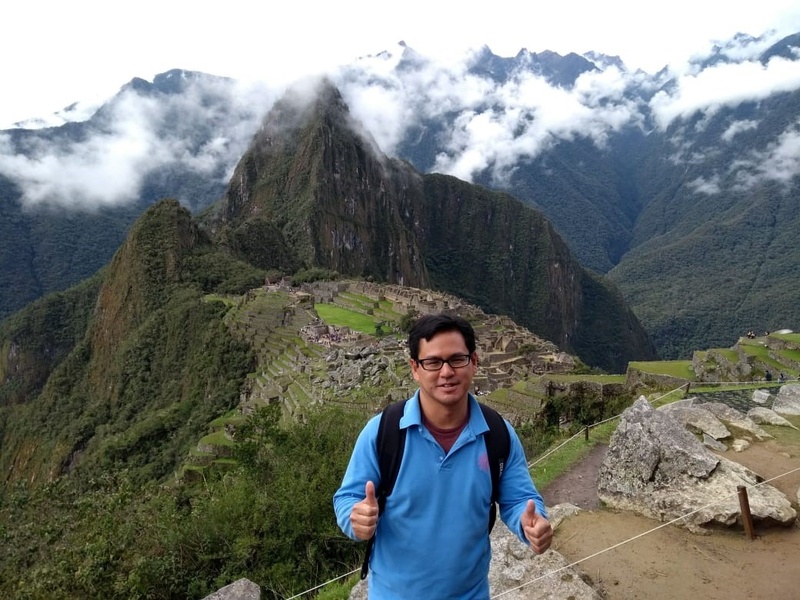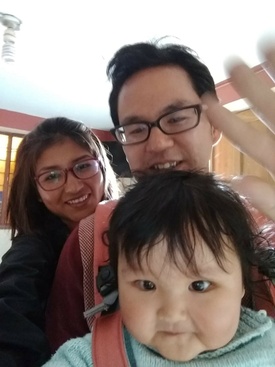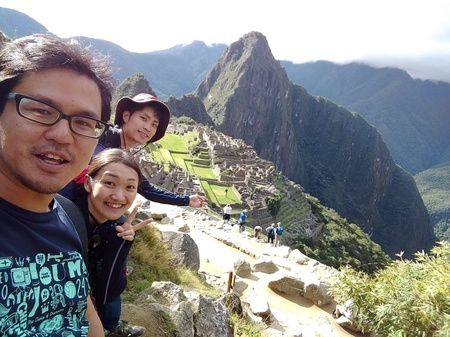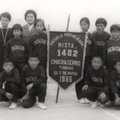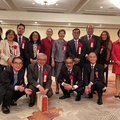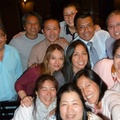Without Machu Picchu, many people around the world would probably be unaware of the existence of Peru. Visiting the Inca citadel is an extraordinary event that mobilizes millions of people from all corners of the planet. However, for Carlos Higa Machu Picchu is like his “work office.” Traveling to one of the main tourist destinations in the world has been part of his routine for seven years, when he began working as a guide for Japanese tourists.
To trace the origins of this story, we must go back to the early 2000s, when Carlos was a twenty-something dekasegi who had been working in Japan for approximately a decade and had reached a point in his life where he had to outline his future. Two paths opened before him: put down roots in Japan or return to Peru.
It didn't solve his dilemma, but he made a decision: study Japanese. Whichever route he took, the language would serve him well. If he stayed in Japan, mastering nihongo would allow him to get better jobs and permanently abandon factory work. If he returned to Peru, he could be a Japanese teacher or tourist guide. If things didn't work out in Peru, there was always the option of returning to Japan. In any case, there was no loss in learning Japanese.
There was another reason to study it: to become independent, to be able to fend for yourself in Japan, not to depend on a translator to do paperwork, go to the doctor, etc. That you need it when you just arrive in Japan, okay; But after ten years, “it's already a lot,” he says.
Once he made the decision to study nihongo , he made another one that changed his life: moving to Okinawa. Why Okinawa? Because I wanted to be in a place where there weren't many Peruvians. He lived in the Kanagawa prefecture, in a Peruvian environment that made the use of Japanese almost unnecessary. If he wanted to learn nihongo seriously, not half-heartedly, he had to immerse himself in the language, study it and practice it all the time. If possible, I had to do without Spanish.
Furthermore, Okinawa, with the warmth of its inhabitants and its climate, with its cinematic beaches, with its peaceful lifestyle, was a powerful magnet.
OKINAWA: THE CALL OF THE BLOOD... AND THE SUN
Carlos lived three years in Okinawa. Writing that they were like a dream might seem exaggerated, but the emotion with which he remembers them, and which his words, his intonation, and his sighs reveal, says that no, there is no exaggeration.
In Okinawa he learned a lot of Japanese. The immersion in the language was total. At school, at the part-time jobs he did to pay for his studies, on outings with friends, etc.
I shared classes, fun, and fun with other foreigners (from the United States, Poland, Switzerland, Australia, etc.) who had also settled in Okinawa to study and with whom I had to speak nihongo . Even when interacting with other Peruvian students he tried not to use Spanish to practice his Japanese.
Paradoxically, his native language temporarily served as a means of support when for a brief period he worked as a Spanish teacher in a Japanese school.
His three years on Okinawa were not consecutive. At the end of the second, he decided to return to Kanagawa to make money and save. It was never so difficult for him to detach himself from a place as it was from Okinawa. Believing that he would no longer return to the land of his grandparents, he cried, something that had never happened to him when saying goodbye to a place. However, some time later a new opportunity was created to return to Okinawa, where he lived another idyllic year.
“Okinawa is very different from the rest of Japan. People are more relaxed, it's not so much work, work, work,” he says. Okinawans are more open and gain confidence quickly (“Come to my house, let's drink”).
It's not just about the people, of course. “I love the weather, I like the summer, the sun. There is the sea, there is music, there is relaxation.”
The people, the landscape, the climate and the environment created a sense of belonging that was not felt in the rest of Japan. “I came to feel Okinawan. In Japan they treated me like a foreigner, in Okinawa they treat you as if you were an Okinawan.”
Today, more than a decade after that stage of his life, he says that from time to time he listens to Okinawan music. Nostalgia knocks him out.
CUSCO: FROM ADVENTURE TO HOME
After about 15 years in Japan, Carlos returned to Peru to settle down. He taught Japanese for a time at a Nikkei school, returned to Japan for a few months for a JICA scholarship, and back in Lima he began working in tourism.
Lima, the city where he was born and spent the first 17 years of his life before emigrating to Japan, would be just a stop for him. Restless, in search of new paths, he decided to try his luck in Cusco. There it stayed. He arrived almost as an adventurer and today he has a made life, with his wife from Cusco, Sdenca, and his daughter, also from Cusco, Nae.
Cusco conquered it from the start. “The cobbled streets, the old buildings, the sun, the clouds so close, the history, the colonial houses,” he lists the things that attract him. Machu Picchu, obviously, first.
However, he admits that after visiting it hundreds of times as part of his work, he can no longer see Machu Picchu with the same enchantment as he did at the beginning. It is inevitable that time and assiduity will erode some of its charm.
Luckily, sometimes the magic returns: the weather is cloudy and Machu Picchu hidden, when suddenly the clouds part so that the Inca citadel appears in all its splendor. The curtain rises for the performance to begin.
On such occasions, he regains the bewitched look of the tourist he was when he visited Cusco for the first time. And although custom has turned Machu Picchu into his work center - which would be an office for others - he realizes that he does not work just anywhere, but in one of the seven wonders of the world.
Nihongo was not the only thing Carlos learned in Japan. Discipline, punctuality and customer service culture have also helped him a lot in his work as a guide for Japanese tourists. You may be tired or annoyed, but all the discomfort disappears when you have to work. He learned that in Japan. He may be in a bad mood, but he arrives at the airport, the tourists he is going to guide in Machu Picchu appear and he changes his chip. Show your best side. “I want them to feel comfortable with me,” he says.
Carlos says that Japanese tourists have a very good reputation in Cusco because they are calm, respectful and always obey instructions. They are clean and punctual. If you meet them at 8 am, five or ten minutes before they are already there. Not like Latin Americans, who can arrive twenty minutes late.
Of course, Latin Americans are more fun. Carlos doesn't work with them, but when they meet on the train or on the way to Machu Picchu he has a great time. “At the touch they gain confidence, you laugh, they talk to you about their country, they ask you about Lima, there is always a topic of conversation.”
Among Latin Americans, soccer is a fascinating topic of conversation. They even talk to him about Odebrecht, the Brazilian company infamous in the region for million-dollar corruption cases. In short, there is always something to talk about. The Japanese, on the other hand, maintain a certain distance and it is difficult for them to open up like Latin Americans.
A particular case is the Okinawans. Once, a guide friend who was working with tourists from Okinawa told him, surprised, that he had scheduled them at 8 and that they had appeared at 8:05. “That's strange, the Japanese aren't like that,” he thought. He couldn't imagine that a Japanese could be unpunctual. Carlos had to explain to him that Okinawans are special.
© 2019 Enrique Higa


